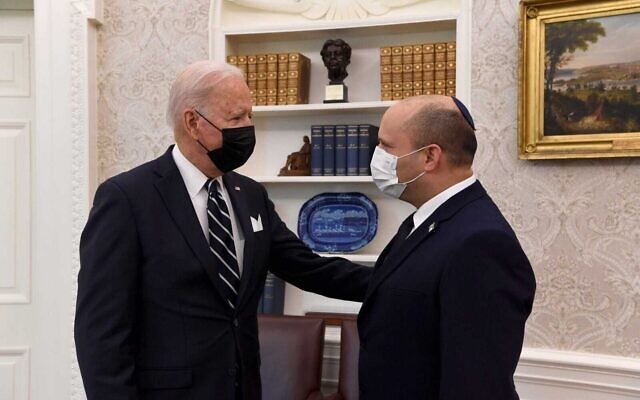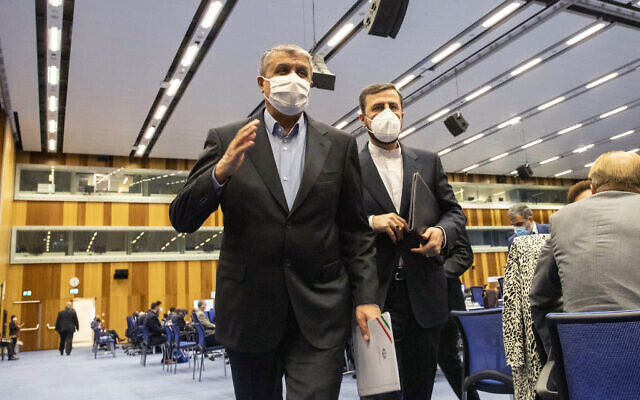Premier’s office says conversation also addresses US killing of Islamic State leader and Russia-Ukraine conflict; Bennett re-invites president to visit Israel

Prime Minister Naftali Bennett and US President Joe Biden held a rare phone call Sunday evening, discussing the Iranian nuclear threat, the campaign against the Islamic State, the Russian-Ukraine conflict and other security challenges.
It was the third phone call between the leaders since Bennett took office in June 2021.
The prime minister used the opportunity to praise Biden for the US operation last week that ended in the death of IS leader Abu Ibrahim al-Hashimi al-Qurayshi. “The world is a safer place thanks to the brave efforts of American forces,” the premier told the president according to the Israeli readout.
According to Hebrew media reports, the US had notified Israel ahead of Thursday’s raid in by US special forces, during which the terror leader blew himself up, killing his wife and children along with himself. Al-Qurayshi once held the “Israel file” in IS, likely putting Israel in a situation to offer intelligence to US counterparts on their target ahead of the mission.
Bennett’s office also said that the two discussed the threats posed by Iran in the region, as well as the “steps to block the Iranian nuclear program.”
On Friday, the Biden administration restored some sanctions relief to Iran’s civilian atomic program, after world powers were believed to have made progress in negotiations in Vienna aimed at reviving the Joint Comprehensive Plan of Action nuclear deal. Washington clarified that the waivers were legally required to allow Iran to make modifications to its nuclear facilities to bring Tehran back into compliance with the JCPOA.

Former president Donald Trump withdrew from the deal in 2018 — three years after it was signed — and implemented a “maximum pressure” sanctions campaign against Iran, which responded by increasingly violating the JCPOA and accelerating its effort toward acquiring a nuclear weapon.
Biden came into office pledging to return to the agreement while also negotiating a subsequent “longer and stronger” deal that would seek to curb Iran’s ballistic missile program along with its support for proxy militia groups throughout the region. But talk of the latter agreement has largely faded as the US has been faced with a new Iranian regime led by President Ebrahim Raisi who has shown less interest than his predecessor in reviving the JCPOA, let alone negotiating an additional deal with the US.
The US says that the coming weeks will be critical in determining whether the JCPOA can be salvaged, though the administration has been employing such a vague timeline for at least a month.
At a cabinet meeting earlier Sunday, Bennett implied that Israel could launch a military strike against Iran even if the Islamic Republic and world powers revive their 2015 nuclear deal.
“We are responsible for dealing with the Iranian nuclear program and, of course, we are monitoring the Vienna talks. “Our position is well-known and clear: an agreement – according to the apparent terms – will damage the ability to deal with the nuclear program. Anyone who thinks that an agreement will increase stability is mistaken.
“It will temporarily delay enrichment, but all of us in the region will pay a heavy, disproportionate price for it,” he said.
The Biden administration, by contrast, argues that the JCPOA is better than the current alternative where there are no curbs on Iran’s nuclear activity whatsoever. Jerusalem maintains that Iran will buckle if its feet are held to the fire through sanctions and a credible military threat.

Israel fears that reviving the nuclear deal between Iran and world powers may leave Tehran only a few months away from having enough fissile material for an atomic bomb, Israeli television reported Saturday.
The original agreement kept Iran a year from acquiring enough nuclear material to use for a bomb, but that breakout time has shrunk since Trump withdrew from the deal.
Also during the Sunday phone call, Biden and Bennett discussed the ongoing conflict between Russia and Ukraine. Israel sought to avoid taking a stance in favor of either side due to its relatively good relations with both, whereas the US has stepped up its rhetoric against Moscow in recent weeks.
Bennett ended the call by inviting the president and First Lady Jill Biden to Israel. He first extended such an invitation during his visit to the White House last August. Biden told Bennett on Sunday that he looked forward to visiting Israel later this year, according to the US readout.
An Israeli official told the Walla news site that the call lasted about 30 minutes.
The US readout issued later Sunday night was relatively similar to the Israeli one, but did make mention of Biden’s commitment to expand partnerships in the Middle East “as exemplified by the Abraham Accords, together with Israelis and Palestinians enjoying equal measures of security, freedom, and prosperity.”
As reported by The Times of Israel
